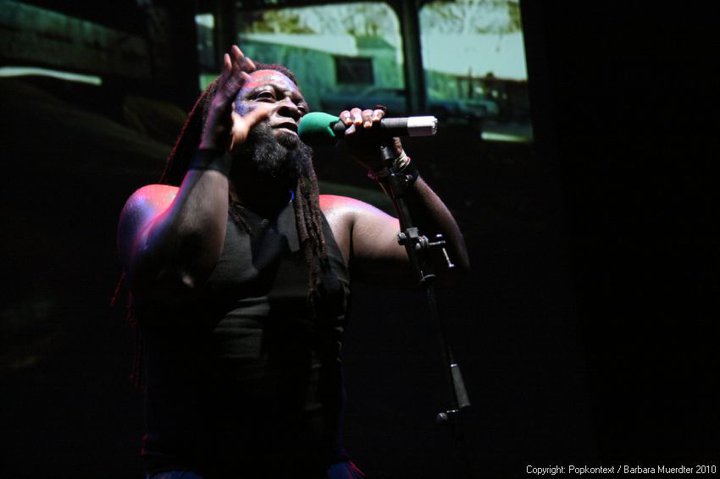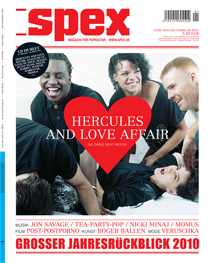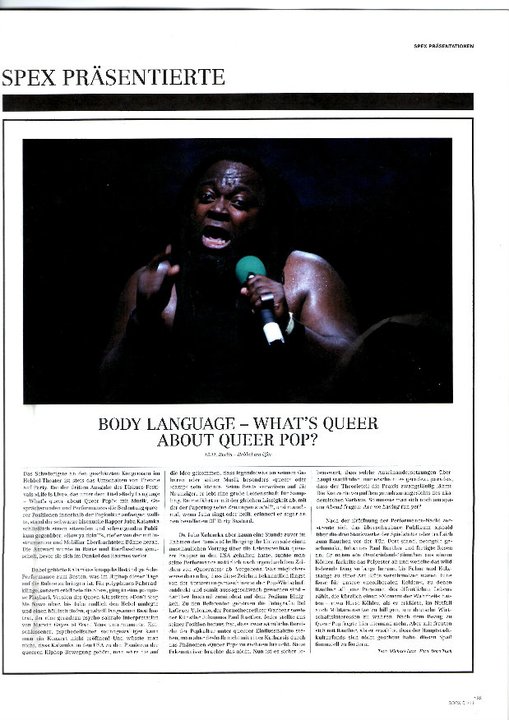
“Body Language –
What’s Queer about Queer Pop?”
Life is Live 3 Hebbel Theater
November 11-13 , 2010
in Spex Magazine #330, December 2010
Original German text by Michael Lutz
translation by Doug Norman
Photo Credit: Barbara muertder/popkontext.de (c)2010
The hardest thing about the esteemed conference at the Hebbel Theater is always the shifting from theory to party. At the third presentation of the Discourse-Festival “Life is Live” which under the title “Body Language – What’s Queer about Queer Pop?” set out to demonstrate the meaning of queer positions within pop culture with music, roundtables, and performances, the black bisexual rapper Juba Kalamka stood before a quiet sitting audience. “How ya doin?” he called out from the stage packed with instruments and furniture/props. The response was mumbled into beards and beer glasses, before fading out in the darkness of the room.
Kalamka’s scant half hour solo-performance belongs to the best Hip Hop has to bring to the stage these days. A polyphonic bicycle-bell concert opened the show segueing into a grandiose karaoke version of the Queen classic “Don’t Stop Me Now,” until Juba finally flipped a switch and triggered an infernally deep, agonizingly slow beat which undergirded a perfectly psycho-sacred interpretation of Marvin Gaye’s “I Want You.” One could not open a concert in a more unflinching, psychedelic, and aurally powerful way! And if you didn’t know that Kalamka is one of the pioneers of queer hip-hop movement in the states, you wouldn’t get the idea that anything about his appearance or music could be especially “queer” or “camp.” His beats evoke the 90s, he nurtures a huge passion for sampling. He navigates rhymes with the same nonchalance a paperboy tosses his newspaper, and sometimes when Juba sings or growls he reminds one of Ol’ Dirty Bastard.
As Juba had given a lucid talk, within the framework of the “Challenging the Universal” panel, about the realities of being a gay rapper in the US barely an hour before, one naturally searched for some kind of sign of “queerness” in his performance. To no avail. It’s likely that because these signs, as is well known, have long since been spotted by the pop music industry recycling machinery, they have been weakened—on that at least everybody on stage seemed to agree. The speakers included photographer Del LaGrace Volcano, porn-theorist Warbear, and artist Johannes Paul Raether. Each laid out her/his position that indeed all areas of pop culture are subject to queer influence/infiltration, one therefore need not expect a catharsis through the phenomenon of “queer pop.” Now, it is surely praiseworthy that such debates take place, only it seems really paradoxical that the theory-part inevitably paralyzes the praxis. The concert almost fizzled in the face of the academic preamble. Thus even late into the evening you had to ask yourself: Are we having fun yet?
After the opening night of the performance, the manageable crowd quickly dispersed over the three stories of the venue or gathered outside the door to smoke. There, painted neon yellow, stood Johannes Paul Raether making roses: He pulled little German flags from a quiver, torched the polyester and waved the wildly flaming thing around until the flag and wooden pole were fused into a kind of flower. A rose for our “neo-liberal heroes,” among whom Raether includes all those public figures who have recently had a “moment of truth” – like Horst Köhler, he explained, when he endorsed emergency military operations in order to protect German business interests. No one asked about the connection to Queer Pop here. But all were happy with Raether when he said that the Capital Cultural Fund had not shied away from financially promoting this fun.

